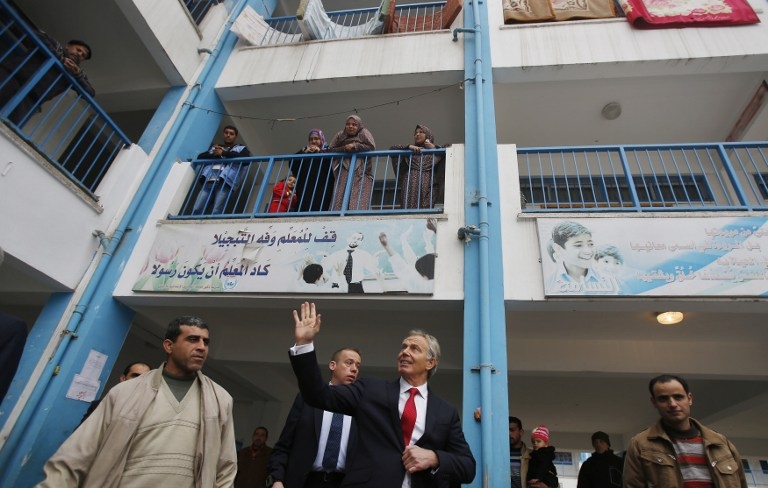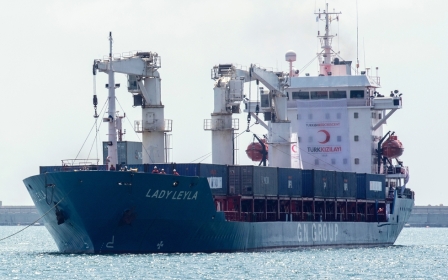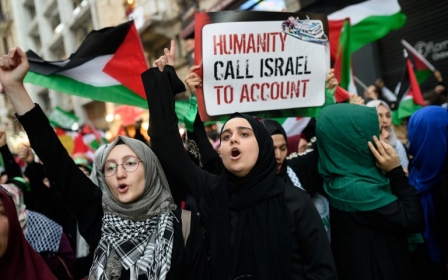Blair still playing leading role in Hamas-Israel talks: Hamas sources

Tony Blair has been working behind the scenes to mediate a peace deal between Hamas and Israel, Hamas sources have revealed to Middle East Eye.
Blair, the former UK prime minister who since leaving office has carved out a career as a Middle East diplomat, was successful in hammering out a recent deal that will see Qatar pay $30m towards the wages of public-sector workers in Gaza.
Senior sources within Hamas – who spoke on condition of anonymity – told Middle East Eye this week that Blair had returned to the Qatari capital Doha recently to play a leading role in negotiations between the Palestinian movement and Israel.
Blair also met Hamas in Doha on a separate occasion to discuss the reconciliation of Hamas and Fatah, groups that have had strained relations since the conflict between the two parties in Gaza and the splitting of the Palestinian Authority in 2007. However that discussion did not get very far, a senior Palestinian source told MEE.
The same source said that Fatah is currently frustrated with Hamas, which is pushing for municipal elections for which Fatah is not prepared.
Blair was previously head of the Quartet on the Middle East, a mediation group consisting of the UN, the US, the EU and Russia, but he stepped down last May.
The source told MEE that thanks to Blair’s efforts, Israel agreed that Qatar would pay the equivalent of a month’s wages – about $30m – to public service workers in Gaza employed by Hamas, which rules the coastal enclave.
The deal was announced by Qatar last week, but no mention was made of Blair’s role in negotiations.
According to the source, the transfer of funds will be arranged through the UN.
The wages deal – which will benefit workers who have not received their full pay packets since 2013 - is part of a larger attempt to ease tensions in the Gaza Strip and pave the way for a longer-term and more comprehensive agreement.
The source said that Blair has been holding meetings with Hamas, Israel and “international parties” aimed at agreeing a 15-year ceasefire in return for a lifting of the years-long Israeli siege of Gaza.
Fatah, Hamas’s West Bank-based rival, confirmed Blair’s involvement to Middle East Eye, but warned that his intercession risked seeing Gaza separated from the West Bank.
“Tony Blair is trying to mediate between Hamas and Israel – but only to aid Israel, and not Hamas,” Nabil Shuath, a member of Fatah’s Central Committee, told Middle East Eye on Wednesday.
“Blair is nothing more than a financial broker. He is working to hammer out agreements that will lead to the separation of Gaza from the West Bank. This will only help Israel’s strategic policy.”
Hamas's official spokesman, Hossam Badran, declined to comment on statements made by other senior members of his organisation.
Representatives of Blair and the Quartet did not make themselves available for comment.
Israel 'ready to work with anyone' for prisoner swap
Yossi Melman, an Israeli security expert and security analyst for the Jerusalem Post, said he was not surprised to find Blair playing an active role in Middle Eastern diplomacy again, despite recent controversy over his role in leading the UK into the invasion of Iraq in 2003.
“He has business ties in Qatar and the region. And Qatar is now the main sponsor of Hamas,” Melman told Middle East Eye.
“He has been around here for years and has access to the [Israeli] prime minister.
“Blair is concentrating on two fronts: a prisoner swap and economic rehabilitation, mainly through establishing a port,” he said.
But, Melman said, Blair’s diplomacy efforts could yet be scuppered not by enmity between Israel and Hamas, but by internal Israeli politics or changes within Hamas’s upper echelons.
Hamas has long argued for the right to build and oversee a port on the coast of the Gaza Strip, where the entry of materials is currently tightly controlled by Israel.
Despite support within the Israeli government for the principle of a Gaza port, Melman says, Prime Minister Benjamin Netanyahu fears that accepting a deal could mean sharing the limelight with political rivals.
“The big question is whether Netanyahu is ready - the minister of transportation is pushing very hard for the port, and Netanyahu perceives this as a threat to his throne in the party,” Melman said.
“It’s about domestic politics more than about public support.”
As far as a prisoner-swap deal is concerned, Melman said that a potential accord could run aground in spite of high levels of support among the Israeli public because of tough demands from Hamas.
The group is reportedly attempting to make a deal for a prisoner swap with Israel that would see Hamas return the bodies of two Israeli army soldiers in exchange for the release of hundreds of Palestinian prisoners.
“The dominant figure in Hamas is now Yahya Sanwar, what I would describe as the defence minister. He’s in charge of co-ordinating between the political and military wings. He himself was released from prison three years ago as part of a prisoner swap. He has toughened Hamas’s demands.
“But the general Israeli attitude is that whoever can deliver [on the prisoner swap] should try. Israel tries to work through all possible channels – German intelligence services, Qatar, perhaps now Turkey after their reconciliation with Israel.
“They are ready to work with anyone.”
This article is available in French on Middle East Eye French edition.
Middle East Eye propose une couverture et une analyse indépendantes et incomparables du Moyen-Orient, de l’Afrique du Nord et d’autres régions du monde. Pour en savoir plus sur la reprise de ce contenu et les frais qui s’appliquent, veuillez remplir ce formulaire [en anglais]. Pour en savoir plus sur MEE, cliquez ici [en anglais].




